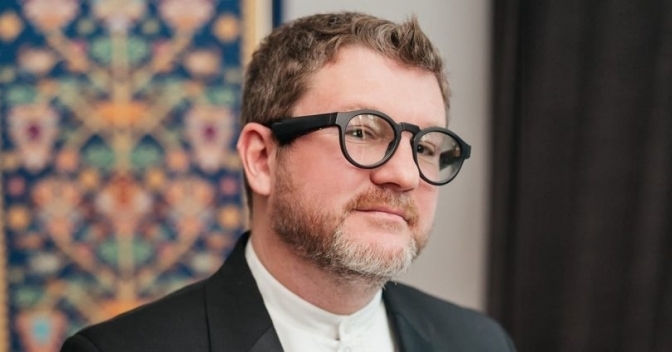
[For urgent updates please follow Ukrainian Freedom News on Telegram]
Tell us about «The Last Barricade». What should your establishments in Lviv be like?
«The Last Barricade» is generally quite a long way. Oles Donii, who organized the Granite Revolution in 1990, opened the first such establishment in 2001 in Kyiv. It was, I emphasize, the only institution in Ukraine at that time that had a hundred per cent Ukrainian cultural code. The Ukrainian language was everywhere, which in 2001 seemed at least strange. Musical evenings and meetings with various prominent personalities took place there: from president Yushchenko to poet Andruhovych and the rock band «Braty Hadiukiny». To get into such a space, to talk with such people was a great rarity in Kyiv, and generally in Ukraine.
In 2004-2005, the first «Last Barricade» was closed. Ten years later, I met with Oles Donii and said that I would like to reincarnate it as an art-gastronomic space, a place where free people gather, a place that is completely Ukrainian. And he didn’t mind.
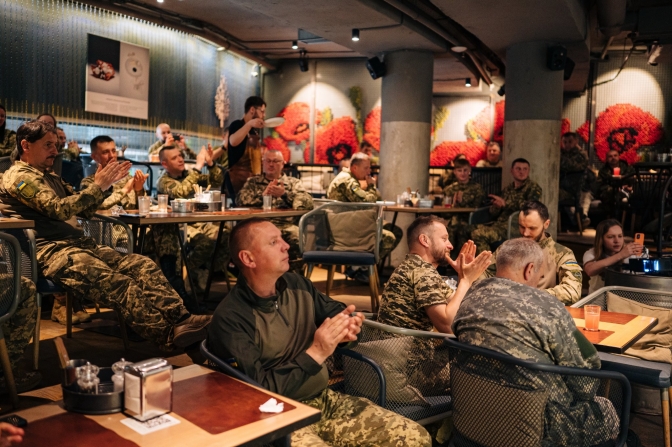
Soldiers at a concert in «The Last Barricade»
So for me, this is a place with a fundamental Ukrainian cultural code that extends to all possible manifestations in this space: food, gastronomy, drinks, mixology and art programs. When this institution was in Kyiv, we made references to three Ukrainian revolutions. In Lviv, they decided to make the first reference to Ukrainian music.
Senses are primarily about the feeling of Ukraine as a whole and about specific things: delicious Ukrainian wine from Bessarabia, or Ukrainian whiskey from Mykulyntsi (Ternopil region). The same with Ukrainian music: from something «modern» to acoustics, from ONUKA to Slavko Vakarchuk.
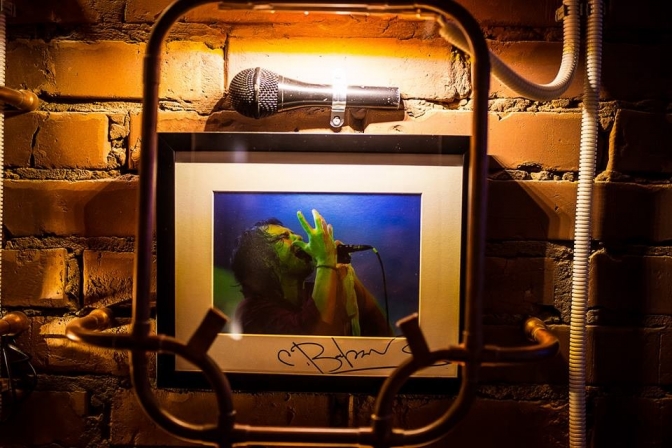
Slavko Vakarchuk’s microphone and a photo with his autograph
Unfortunately, Ukrainians don’t like going to Ukrainian institutions. They want sushi, pizza, khinkali, khachapuri, or kebab. And for us, restaurateurs, this is a challenge: how to do this, what other meanings are needed, how many more revolutions and wars are needed, so that Ukrainians will finally go to Ukrainian establishments?!
Read also: Here are restaurants that relocated to Lviv because of the war
However, Ukrainians finally understood that gastronomic culture is a fundamental culture. For some reason, we always talked about music, literature, fine arts, but food was often neglected. And this is a cultural code. When we go somewhere, this is what we think about first of all. Housing is in second place, museums are third.
It’s a pity that we recall and become proud of borscht only when the Russians try to «take» it away from us once again.
What is the amount of investment in the Lviv establishments you have opened?
As a rule, we do not reveal such information, not because we do not want to. Unfortunately, it’s very difficult for people to accept it as a norm. They don’t understand what it means to build a public catering facility on one and a half thousand square meters in two years. I mean «The Last Barricade».
To create a public catering establishment in Ukraine, you need to invest from one to two thousand euros in one square meter. There are some fellow restaurateurs who can afford it, and I’m very happy about that.
Tell us about gastroculture in Lviv. Is it different from Kyiv? What is its essence?
I can observe it retrospectively. In Lviv, we actively started working together with our partners in 2015 or 2016. First, they opened Churrasco, then Mushlya on Rynok Square, and later – «Bilyi Nalyv» and «Kanapa».
The culture changed a lot during this time. At first, these were attractions, first of all, oriented to the tourist flow. With the arrival of other restaurateurs from other regions to Lviv, restaurants began to focus on the gastronomic component.
Lviv’s gastroculture still differs from Kyiv’s, albeit not significantly – by 30 per cent. Yurko Nazaruk, co-owner of the «!FEST» Holding of Emotions, wrote five years ago that he was simply lucky to live in a museum city where millions of tourists come. We were not so lucky in Kyiv, and we restaurateurs have always been a little jealous of Lviv. Then Covid-19 started, and everyone realized that a museum city can be both an advantage and a problem. It was much more difficult for the restaurant business of Lviv to survive the coronavirus.
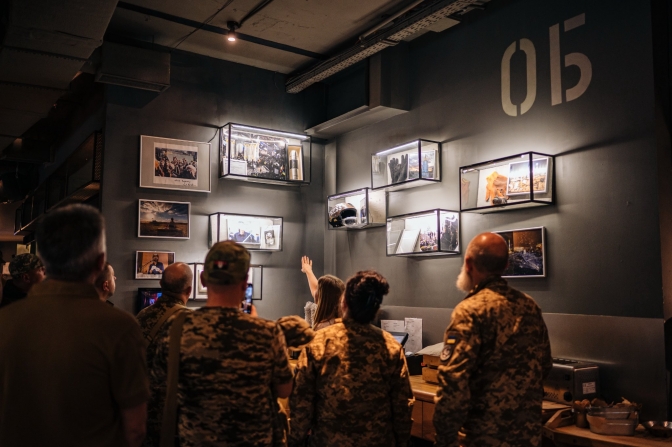
We also saw that the so-called average checks differ: Lviv residents were ready to spend a little less in public catering establishments, but they expected more of some kind of experience. It was also a challenge for us. Currently, this is also changing, because many people moved to Lviv during the war. I feel that the consumer map is changing here again: the average check has increased a little – this has balanced supply and demand. Now, Kyiv and Lviv have equalized because there are no tourists either here or there. We now rely solely on internal consumption.
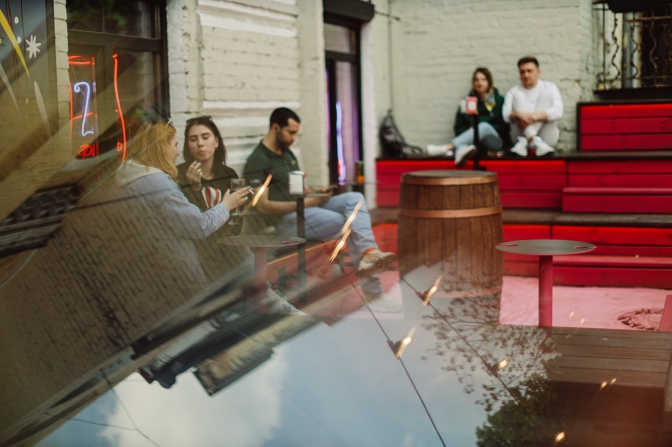
Our own basic philosophy is that I create establishments and develop menus, portions, dishes, and determine pricing, based exclusively on the capabilities of consumers and their expectations. We have huge statistics based on millions of checks for 12 years. We know and see how the solvency of our clients fluctuates by one-tenth of per cent. We have a mission to get people out of the house, where they will spend their 100 hryvnias on borscht with a cutlet. 90% of people don’t like to cook, but in 70 Soviet years, they learned it because, they say, it’s expensive in the establishments.
For these 100 hryvnias, we give at least expectations and try to exceed them by another 20-30 per cent. For 100 hryvnias, you can eat an oyster, a hotdog, drink a cool liqueur, a glass of cider, and eat an apple pie in «Bilyi Nalyv». That is, the full spectrum. We say: «We’ve banquetted. With delicious dishes. One euro for an oyster? Wow! I saw this in France, Spain, Italy. And this is here, on Rynok Square! With cool drinks, not just «beer-vodka-rock-n-roll».
Read also: Random locals helped us settle here. The Mariupol refugees who relocated their restaurant to Lviv
We have this approach by knowing the budget of our guests because our guests are ordinary people. We are in the home cooking competition segment. In general, the gastronomic market looks like this: 80% of people cook at home, 20% go to cafes, bars, and restaurants, at best three times a year. And we are forced to come up with an interior, a menu, in order to get people out of the house at least three times a year for a special event, to offer them to spend 100 hryvnias, to stay within the million-worth interior with guacamole, avocado, shrimp, a glass of good wine and take a photo.
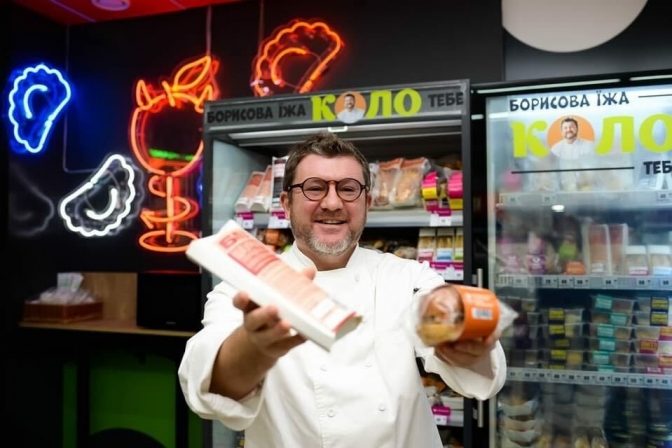
We want people to enjoy life even in a terrible time of war. And we are grateful to the guests, they perceive it as an opportunity to disconnect from this hell in which we are, and feel at least a little of the normality of this life. If earlier we did it as a reward, now we do it as an opportunity for psychotherapy for 29 hryvnias, not 50 dollars.
What establishments, apart from yours, do you like in Lviv, where you can eat a cake and drink a cup of coffee?
There are a lot of them. When I’m in Kyiv, I don’t have the opportunity to go to any other institutions, because I have a lot of work. In Lviv, it’s always like a little trip for me. In the morning, obviously, «Svit Kavy», because I haven’t found a better coffee yet. Lunch can be in the «Very High Kitchen». It’s just that I really love and respect this approach when chef establishments are made. In my opinion, it’s one of the best in Europe, where chefs cook as creative individuals, without a menu. I’m interested not just in coming and eating a piece of meat, but in talking with the chef, giving him the opportunity to express himself creatively, feeling myself at the moment that I like, and giving him the opportunity to be creative, to serve me what he sees best. This is mutual respect. If this institution were in Europe, the amount in this check would be five to ten times larger.
It can also be «Rebernya», if you have the nerve to stand in line. And, of course, Mushlya, especially if my wife and I want something light to eat. Now, I dream of going to «Babo Gardens». There may be «Hungry Mykola» and «Bachevsky Restaurant». Go to «Drunk Cherry», have a drink and around the corner go to «Bilyi Nalyv» – in the evening, it’s a must-have.
Read also: The best restaurants in Lviv were given the «Salt» award. List
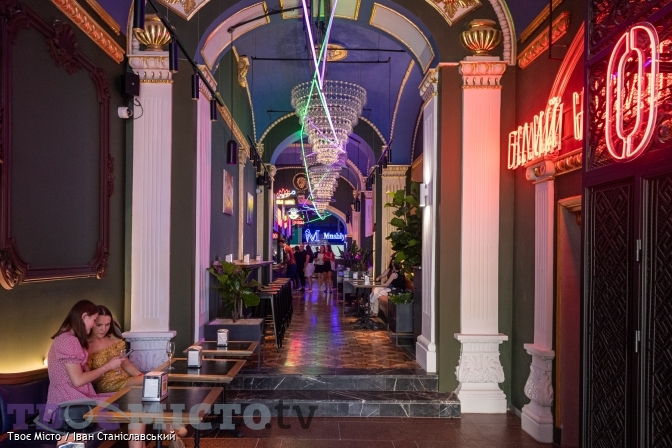

Has did the war affect your business? Are you currently working with or without profit? Maybe, you have discovered any opportunities for yourself during the war that you did not see in peacetime?
Right now, we can’t even tell if we’re in profit or not. We recorded losses due to destroyed establishments, and are still thinking of taking out some equipment and helping our partners move to Lviv, open a small window or let them in, make some kind of kitchen from the equipment that survived.
We are in such a storm right now, just in manual mode trying to do what we do best, smiling no matter what happens. And this despite the fact that we employ four thousand people. We have no right to let this sadness, this negativity into us. We are a service business, so we have to create such emotions so that you feel like you are resting with us.
Is it hard to find people to work with now? What is the education quality of those who are trained by colleges and state universities? Do you have a school where you can learn to be a barista, waiter, or chef?
It’s a difficult question, because again, it can be commented on in the long run. And then, unfortunately, working in catering establishments as a chef, waiter, cashier, or bartender is not prestigious. I don’t know almost any higher education institution, not even a college of any kind, that would more or less professionally train chefs or technologists. Maybe, something is still left, but if there’s no demand – then also no supply.
We have Borysov Academy, which is currently working mostly online. Previously, our partner «Metro Cash and Carry» and I did it live. When I opened the academy, I dreamed that it would follow this algorithm: you come, and even if you have no money, we will teach you, but you just study from morning to night – from dividing tuna carcasses and beef into steaks to theoretical knowledge. However, I know that in half a year you will become a professional. And then, I guarantee a contract for a year, where you will work out the grant we gave you. You will simply return 10% of the salary for training.
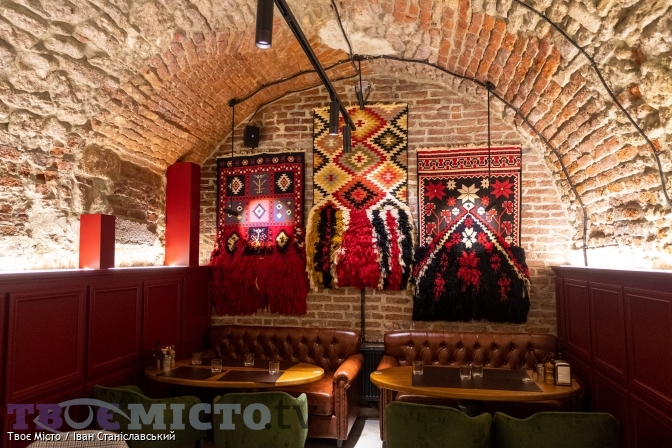
It failed... No one came, no one is interested, because there is no conscious choice of this profession. People said: «How? Not getting a salary for half a year even when you pay for my education? No, why? I will go somewhere else, where they will pay me this thousand hryvnias from the first day and teach me.» Unfortunately, the market is built like this.
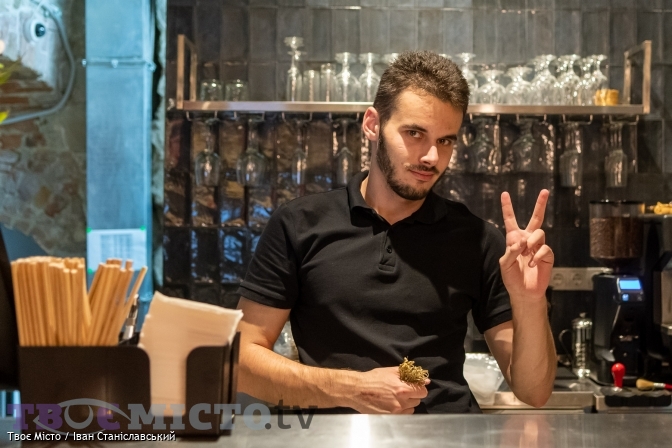
If you narrow down the issue to the last six months, the first few months were a hellish problem with the team, with personnel. Many women went to other cities, abroad, some of our employees, boys, went to the Armed Forces. Some were simply physically afraid to work, to go to volunteer kitchens, and others were initiated and changed professions.
In the first months of the war, there were not many personnel, and we shouted on social networks that we needed cooks. It’s just that people from nearby houses in the center of Kyiv came and stood at the stove for 10 hours, because 1.5-2 thousand portions of food had to be prepared.
It is easier now, many have returned, having understood the value of working in a company that, in principle, works. Now, we have several willing people for one place. The main thing is that all our employees perform their work with a smile and with high quality. I would like to thank all of them very much, because after work they also volunteer, collect money and work beyond the norm to send to advanced food. Everyone is incredible!
How do you help the front? You already talked about volunteer kitchens. What other initiatives do you have?
We have been using a standard working mechanism for eight years. We have many institutions, but since March 2014 we’ve been doing everything to help the front, without stopping for a single day. We were a little more prepared than our other colleagues in the workshop, because, I repeat, we have worked out all the mechanisms: what the food should be, how it should be packaged, what are the nuances regarding the temperature regime, and how far it can be sent.
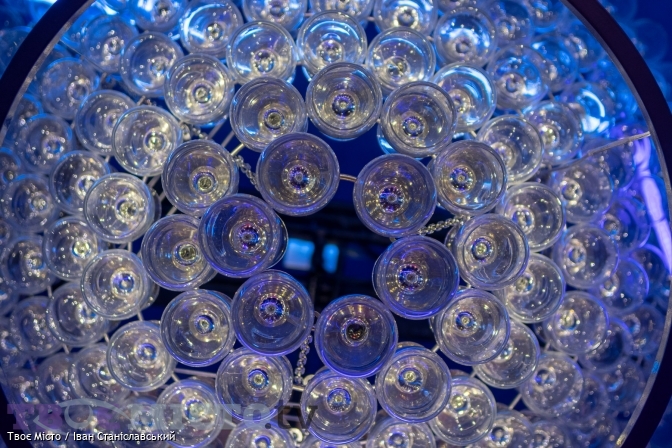
Previously, we used to provide a military hospital in Kyiv, now we have expanded it to seven or eight volunteer kitchens. In the last three or four months, we had contacts with foundations that help us, first of all, with «World Central Kitchen». We are very grateful to them for their help, because it is very expensive. In the first months, we used all our reserves and money. Everything was sent to doctors, territorial defense, police, and the Armed Forces.
For now, the focus is on preparing properly packed lunches for the front lines. And this is two or three thousand servings per day. During the day, we work as a regular restaurant, while at night and in the morning we prepare volunteer meals. I don’t even know when it will be possible to dream about profits. It’s not time yet. The main thing now is to support each other so that our pants don’t fall down. And to move as quickly as possible to victory in order to expel the Rashists from our land.
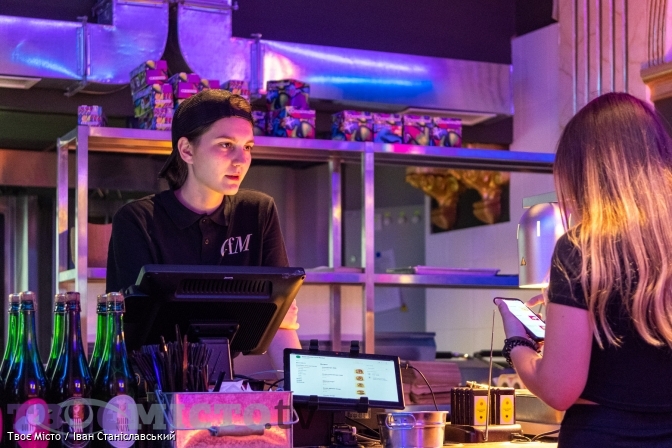
What is your favorite cuisine, besides Ukrainian one?
We are Europeans, and I think that Mediterranean cuisine, with simple fish, simple vegetables, good oil and bread, is the best of the existing. There was a time when I thought I liked Asian cuisine – Malaysian, Indonesian. I implemented this concept in the restaurant Oxota na Ovets.
But I haven’t eaten anything Asian in a long time. Instead, I like Mediterranean, Ukrainian cuisine, which is part of European cuisine. The range of products that we have in Ukraine... Only Italy is so lucky.
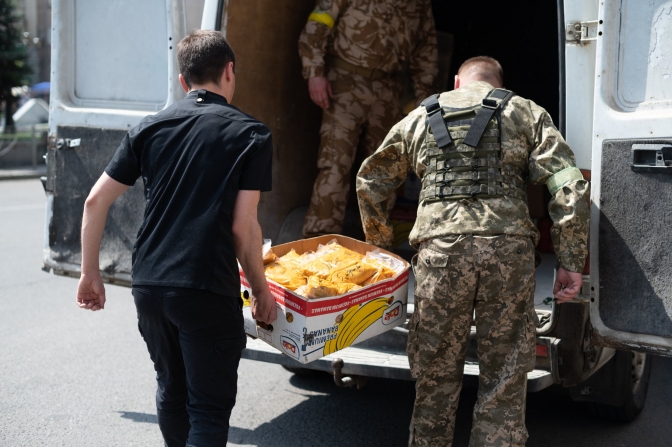
That’s why I love all our regional cuisines. We somehow counted 27 seafood products that can be made from what is found in the Black Sea: 10-12 types of fish, rapana, mussels, oysters, cockles. The Carpathian mountains, which «give birth» to so many porcini mushrooms that we then buy them under the name «porchini» as Italian ones. But if we read where they are collected, then 80% are from our Carpathian Mountains. Then they are repackaged and sold dried as mushrooms, because there are not as many mushrooms there as we have. And there are as many berries as in Ukraine, nowhere in the world.
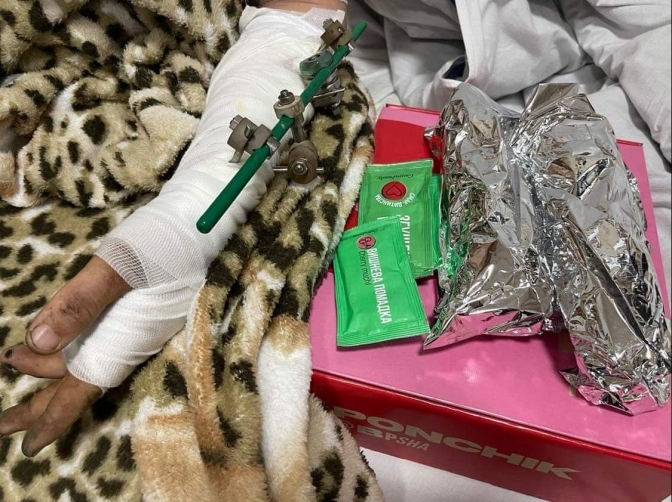
What are your plans? Would you like to open new establishments? If so, in which cities, or maybe abroad?
We adjusted our strategy a bit. Our QSRD restaurants have been scaling for the past three years. This is a fast way to the development of gastronomic culture. Our task is to get people out of the house so that they go to public catering establishments several times a week. That is, in terms of speed and check, we work in the McDonald’s and KFS segment, but our establishments operate in 20 formats – from seafood, bars to mozzarella, Philadelphia Roll & Bowl. That is, the entire spectrum, theoretically interesting to our people to meke them leave the house and go out to eat, but for an average, check of up to five euros and with a withdrawal speed of two or three minutes.
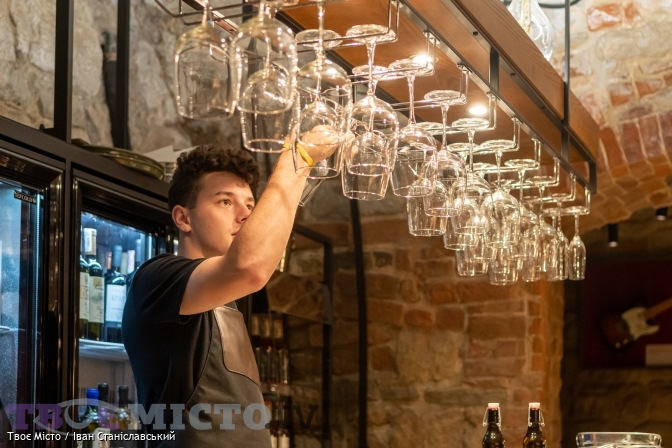
Three years ago, they set themselves the goal of covering all of Ukraine. We have covered 24 cities, and now, unfortunately, we have lost a few cities, because the facilities are bombed or closed, but we will restore them exactly when we drive out the «orcs». We planned to open 50-70 establishments per year in Ukraine. Now, we are planning 20-25.

Our second dream is to scale to the world. Finally, we can use this as a window of opportunity and open establishments in Europe with Ukrainian staff. Previously, it was difficult in the West to do this, it was necessary to hire locals, but Ukrainians were not allowed. Now, this procedure has been somewhat simplified. We show how we fight, and now we can also show what kind of entrepreneurs, what kind of restaurateurs, what active people we are.
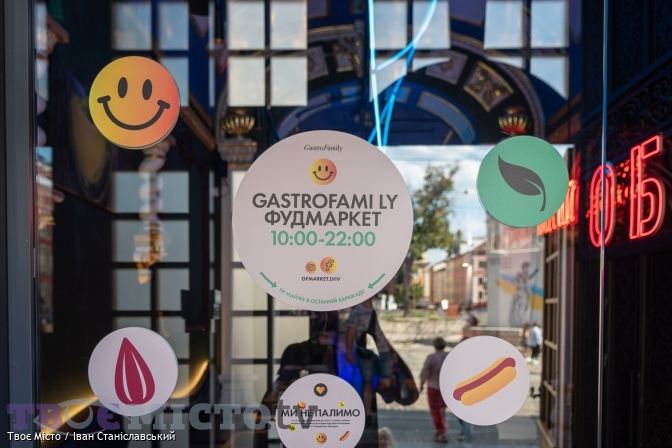
I would like to say, as the Japanese say, that this is a plan for 10-15-50 years, but now we are thinking in categories for the next few months, six months at most, and then we will see. Well, the key is to bring our victory over the Muscovites as close as possible.
Roman Tyshchenko-Lamanskyi, Translated by Vitalii Holich
Photo by Ivan Stanislavskyi and from Dmytro Borysov’s page
Full or partial republication of the text without the written consent of the editors is prohibited and considered a violation of copyright.
Follow us on Facebook and Instagram. Lviv Now is an English-language website for Lviv, Ukraine’s «tech-friendly cultural hub.» It is produced by Tvoe Misto («Your City») media-hub, which also hosts regular problem-solving public forums to benefit the city and its people.











